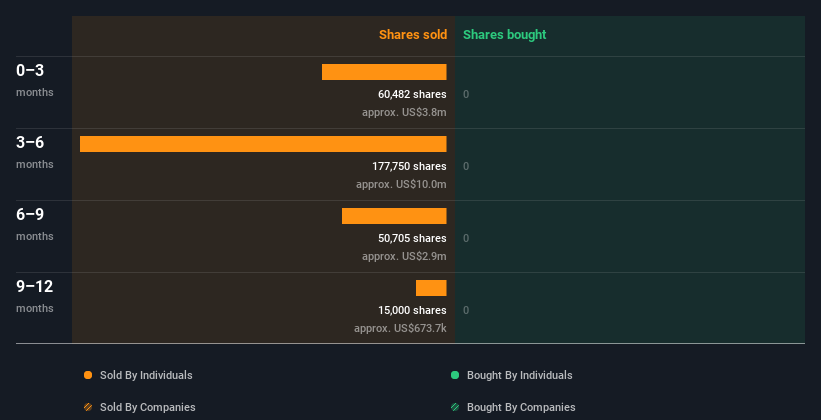- United States
- /
- Diversified Financial
- /
- NYSE:PFSI
Possible bearish signals as PennyMac Financial Services, Inc. (NYSE:PFSI) insiders disposed of US$18m worth of stock
Many PennyMac Financial Services, Inc. (NYSE:PFSI) insiders ditched their stock over the past year, which may be of interest to the company's shareholders. When analyzing insider transactions, it is usually more valuable to know whether insiders are buying versus knowing if they are selling, as the latter sends an ambiguous message. However, when multiple insiders sell stock over a specific duration, shareholders should take notice as that could possibly be a red flag.
Although we don't think shareholders should simply follow insider transactions, we do think it is perfectly logical to keep tabs on what insiders are doing.
See our latest analysis for PennyMac Financial Services
The Last 12 Months Of Insider Transactions At PennyMac Financial Services
Over the last year, we can see that the biggest insider sale was by the Independent Director, Joseph Mazzella, for US$4.1m worth of shares, at about US$58.67 per share. That means that an insider was selling shares at around the current price of US$56.75. We generally don't like to see insider selling, but the lower the sale price, the more it concerns us. Given that the sale took place at around current prices, it makes us a little cautious but is hardly a major concern.
Insiders in PennyMac Financial Services didn't buy any shares in the last year. You can see a visual depiction of insider transactions (by companies and individuals) over the last 12 months, below. By clicking on the graph below, you can see the precise details of each insider transaction!

If you like to buy stocks that insiders are buying, rather than selling, then you might just love this free list of companies. (Hint: insiders have been buying them).
Insiders At PennyMac Financial Services Have Sold Stock Recently
The last quarter saw substantial insider selling of PennyMac Financial Services shares. In total, insiders sold US$3.9m worth of shares in that time, and we didn't record any purchases whatsoever. Overall this makes us a bit cautious, but it's not the be all and end all.
Insider Ownership Of PennyMac Financial Services
Many investors like to check how much of a company is owned by insiders. Usually, the higher the insider ownership, the more likely it is that insiders will be incentivised to build the company for the long term. PennyMac Financial Services insiders own about US$291m worth of shares (which is 10% of the company). This kind of significant ownership by insiders does generally increase the chance that the company is run in the interest of all shareholders.
So What Does This Data Suggest About PennyMac Financial Services Insiders?
Insiders sold PennyMac Financial Services shares recently, but they didn't buy any. And even if we look at the last year, we didn't see any purchases. While insiders do own a lot of shares in the company (which is good), our analysis of their transactions doesn't make us feel confident about the company. So these insider transactions can help us build a thesis about the stock, but it's also worthwhile knowing the risks facing this company. Be aware that PennyMac Financial Services is showing 3 warning signs in our investment analysis, and 1 of those shouldn't be ignored...
Of course PennyMac Financial Services may not be the best stock to buy. So you may wish to see this free collection of high quality companies.
For the purposes of this article, insiders are those individuals who report their transactions to the relevant regulatory body. We currently account for open market transactions and private dispositions, but not derivative transactions.
New: Manage All Your Stock Portfolios in One Place
We've created the ultimate portfolio companion for stock investors, and it's free.
• Connect an unlimited number of Portfolios and see your total in one currency
• Be alerted to new Warning Signs or Risks via email or mobile
• Track the Fair Value of your stocks
Have feedback on this article? Concerned about the content? Get in touch with us directly. Alternatively, email editorial-team (at) simplywallst.com.
This article by Simply Wall St is general in nature. We provide commentary based on historical data and analyst forecasts only using an unbiased methodology and our articles are not intended to be financial advice. It does not constitute a recommendation to buy or sell any stock, and does not take account of your objectives, or your financial situation. We aim to bring you long-term focused analysis driven by fundamental data. Note that our analysis may not factor in the latest price-sensitive company announcements or qualitative material. Simply Wall St has no position in any stocks mentioned.
About NYSE:PFSI
PennyMac Financial Services
Through its subsidiaries, engages in the mortgage banking and investment management activities in the United States.
Proven track record with moderate growth potential.
Similar Companies
Market Insights
Community Narratives



